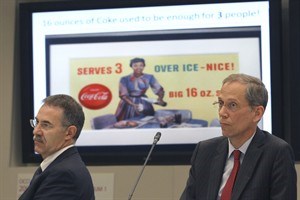David B. Caruso

New York City Health Commissioner Thomas Farley, right, and board member Joel Forman listen to a presentation on sugary drinks during a New York City Board of Health meeting, Tuesday, June 12, 2012 in New York. Mayor Michael Bloomberg's proposal to ban large sugary drinks from New York City eateries is moving forward. The proposal was formally submitted to the city's board of health Tuesday morning. The board is expected to hold a series of public hearings during a 90-day comment period. (AP Photo/Mary Altaffer)
June 12, 2012 - 5:56 PM
NEW YORK, N.Y. - New York City's Board of Health signalled strong support Tuesday for the mayor's plan to fight obesity by banning the sale of large, sugary beverages at local restaurants.
The proposal by Mayor Michael Bloomberg would prohibit licensed food service establishments in the city from using containers bigger than 16 ounces to serve high-calorie drinks like colas, lemonade and punch.
People would be free to buy another round, but restaurants couldn't serve the 20-ounce cups now so popular at fast food eateries, movie theatres, and food courts.
The proposal only needs to win approval from one government body to become law, the city's unelected board of health, and the panel took the first step toward making that happen Tuesday with a unanimous vote to begin a six-week public comment period.
A formal vote whether to approve the measure isn't scheduled to take place until Sept. 13, but several board members spoke strongly in favour of the proposed restriction. Some even wondered aloud why the city wasn't going further, and limiting portion sizes of other popular high-calorie foods.
One raised an objection to a proposed exemption for milk products, which would leave people free to continue enjoying big milkshakes. Another said he didn't like the idea that some restaurants could continue to offer people bottomless cups of soda, with free refills.
Board member Bruce Vladeck, a former administrator of the federal agency responsible for Medicare and Medicaid, asked why the city wasn't considering portion-size limits for buttery, movie theatre popcorn.
"The popcorn isn't a whole lot better, from the nutritional point of view," he said.
Outside the meeting, Andrew Moesel, a spokesman for the New York City Restaurant Association, said those comments were evidence that the drink restriction would ultimately lead to further limitations on other treats New Yorkers enjoy.
"Some of the board members seemed to think that the proposal didn't go far enough, and I found that very alarming," he said.
Moesel said his organization's 1,000 members considered the proposal an infringement on consumers' legal rights. He said the group would consider legal action to stop it from taking effect.
The Board of Health is independent, but its members are appointed by the mayor and it has no record of challenging his initiatives.
A public hearing was scheduled for July 24. Revisions are still possible, but opponents clearly face an uphill fight. From a public health perspective, there are few reasons to oppose the rule.
Bloomberg and the city's health commissioner, Dr. Thomas Farley, say they are proposing the ban because obesity has become a health crisis and because sweetened soft drinks bear a disproportionate share of the blame for making people so fat.
Obesity kills 5,800 people every year in New York City, considerably more than the number of U.S. troops who died in the entire Iraq War, the health department said. Diabetes, a disease that can be linked to obesity, kills another 1,700 people. Another 2,600 are hospitalized for limb amputations necessitated by complications of diabetes.
City health officials estimate that treating health problems caused primarily by obesity in New York City costs $4 billion per year.
"The sugary drinks are the item that is most closely associated with the growth of this epidemic," Farley said.
The rule would apply to any beverage with more than 25 calories per 8 fluid ounces. Coca-Cola and Pepsi are both around 100 calories per 8 ounces.
Alcoholic beverages would be exempt, as would natural fruit juices. The rule wouldn't apply in grocery stores, except for some that also serve enough prepared food to be inspected by the city.
News from © The Associated Press, 2012